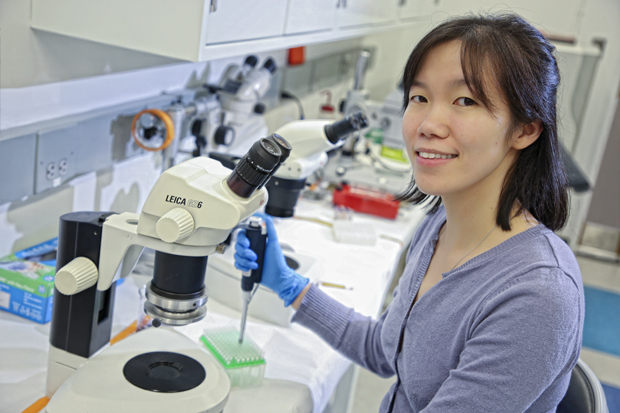Amy Lee named a Pew Scholar in the Biomedical Sciences
 Photo/Mike Lovett
Photo/Mike LovettAmy Lee
“The funding from the Pew Charitable Trusts will be used to understand how incorrect gene regulation contributes to dysregulated cell growth such as in cancer. As junior faculty, I am especially appreciative to be awarded funding that supports creative and high-risk research and will allow my lab to pursue innovative research directions,” Lee said.
Each Pew Scholar receives a $300,000 grant over four years to advance their explorations of the biological mechanisms underpinning human health and disease. The scholars—all of whom have held assistant professor positions for three years or less—enter a vibrant community of researchers who have received awards from Pew since 1985. Current scholars meet annually to discuss their research, and exchange ideas with peers in fields outside of their own.
“The 2018 scholars bring fresh curiosity and insight to aspects of health and biology in critical need of investigation,” said Craig C. Mello, Ph.D., a 1995 Pew scholar, 2006 Nobel laureate in physiology or medicine, and chair of the national advisory committee for the scholars program. Mello is the chair of molecular medicine at the University of Massachusetts Medical School. “I’m excited to see their work invigorated by new resources and opportunities to collaborate with Pew’s community of nearly a thousand biomedical researchers.”
The Lee lab will investigate how cells become specialized by selecting which specific proteins they will produce. Although they may contain the same genetic information, different cell types in the body look and behave very differently—in large part because they make different proteins. The instructions for making these proteins are provided by molecules called messenger RNAs. As a postdoctoral fellow, Lee discovered that a protein complex called eIF3 selectively binds to particular messenger RNA molecules, thereby directing the synthesis of specific proteins.
Now, using a suite of cutting-edge techniques in biochemistry, cell and molecular biology, and computational and structural analyses, her lab will catalog the complete set of messenger RNAs recognized by eIF3 and analyze the sequences or structural features that distinguish them. The lab will also assess how depletion of eIF3 alters the development and proliferation of cells. Because eIF3 is overproduced in glioblastomas and breast and colon cancers, their findings could lead to the development of drugs that block the binding of eIF3 to messenger RNAs that promote inappropriate proliferation or malignant cell behavior.
Lee received a doctorate in virology in 2012 from Harvard University and completed postdoctoral training at the University of California, Berkeley. In 2017 she was awarded a Sloan Research Fellowship, the Charles H. Hood Foundation Child Health Research Award and was named a Searle Scholar.
This year’s Pew Scholars were selected from 184 nominations, each submitted by a leading academic or research institution in the United States. The 2018 awardees are working to solve biomedical puzzles including the development of cancers linked to viruses, how brain circuits enable verbal communication, and the ways in which the body senses and responds to external stimuli. The results of their research could provide new scientific foundations for potential treatments of metastatic cancer, infectious diseases, and psychiatric disorders.
Categories: Research, Science and Technology





